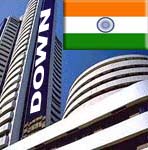India's Sensex crashes 11 per cent to three-year low
 New Delhi - India's benchmark Sensex on Friday crashed 11 per cent to end trading at a three-year low of below 9,000 as investors sold heavily after the central bank disappointed them by keeping key interest rates unchanged.
New Delhi - India's benchmark Sensex on Friday crashed 11 per cent to end trading at a three-year low of below 9,000 as investors sold heavily after the central bank disappointed them by keeping key interest rates unchanged.
The 30-share Sensitive Index, which had lost 912 points in the last two sessions, crashed 10.92 per cent shortly after a credit and monetary review was announced by the Reserve Bank of India.
By the end of the day, it closed down 1,070.63 points, or 10.96 per cent, at 8,701.07. The index had last tumbled below 9,000 in November 2005.
Similarly, the broader 50-share Nifty index nose-dived by 12.2 cent to 2,584.
Banking, real-estate, oil and gas stocks, which lost 12 to 15 per cent of their values, were the major contributors to the Sensex's fall, the second-biggest since January 21 this year when it fell by 1,408 points.
This was also the biggest intra-day fall in percentage terms in more than four years - the Sensex had fallen by 12.53 per cent on May 17, 2004.
The PTI news agency reported that shares including the blue-chip Reliance Power, DLF Limited, Ranbaxy, Jaiprakash Associates, Jet Airways, Suzlon Energy and Idea Cellular had fallen to record lows.
Market analysts said there were increased capital outflows by foreign funds and nervous selling by investors tracking weak global markets and poor quarterly corporate earnings.
They said the central bank's failure to announce any changes in key rates to infuse liquidity into the banking system as well as concerns about India's growth contributed significantly to the crash.
The investors were expecting bold moves by the central bank, such as a further cut to the cash reserve ratio, to stem the liquidity crisis.
The policy came amid a heightened fear of recession because of the global financial crisis and India's 11-per-cent inflation rate.
The past few weeks have seen the central bank cut a key rate and the cash reserve ratio to impart liquidity in the banking system.
Finance Minister P Chidambaram said the review of the central bank's policy was on expected lines and the central bank would take radical steps to deal with the emerging situation.
"We are not the cause of the problem, but we want to be part of the solution," he said. "We are affected by these ripple effects of the global crisis, but it is necessary to remain calm and confident so that we can ride this crisis out."
"Calm will return to the world markets, and once calm returns, we will get back to our higher growth trajectory," he added.
Market analysts said a depreciating rupee, which breached 50 rupees to the dollar in opening trade Friday, was another factor behind the falling stocks.
Analysts warned they believe the Sensex would fall further. The bellweather index has more than halved from its all-time high of 21,206.77 in January.
Owing to the crash and the depreciating rupee, about 90 Indian companies remained with a market capitalization of at least 1 billion dollars. There were as many as 226 companies with a market value of 1 billion dollars and above in January. (dpa)